Unit 3 Could you please tell me where the restrooms are?Section B 2 (2a-2d)课件(共37张PPT)
文档属性
| 名称 | Unit 3 Could you please tell me where the restrooms are?Section B 2 (2a-2d)课件(共37张PPT) |  | |
| 格式 | pptx | ||
| 文件大小 | 938.1KB | ||
| 资源类型 | 教案 | ||
| 版本资源 | 人教新目标(Go for it)版 | ||
| 科目 | 英语 | ||
| 更新时间 | 2023-09-14 22:02:47 | ||
图片预览

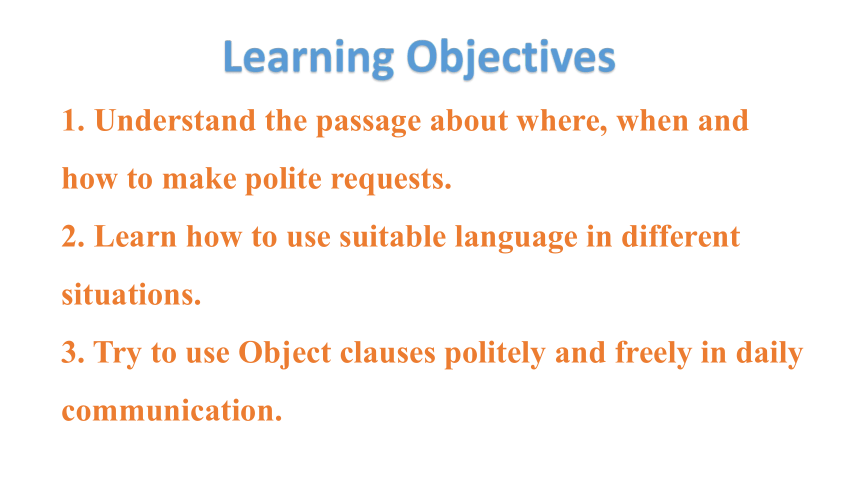

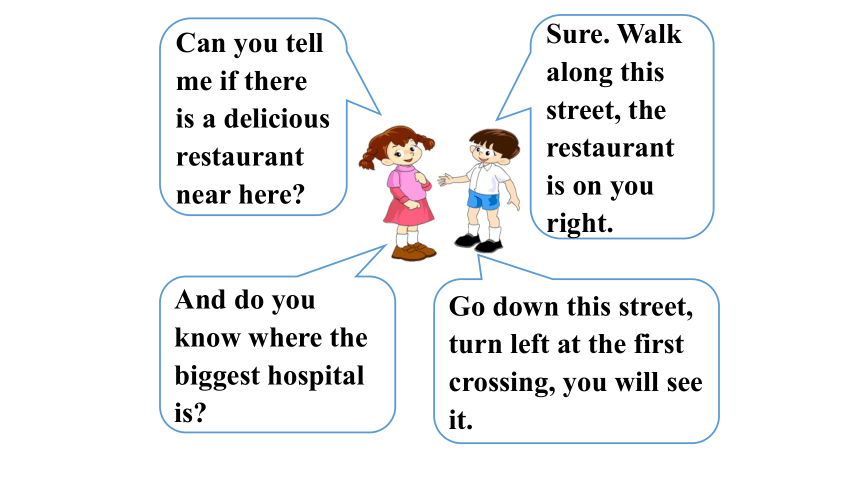
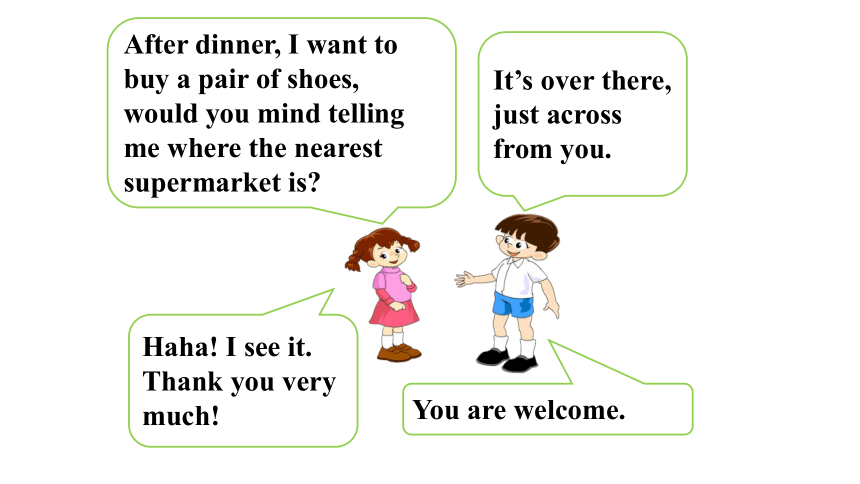
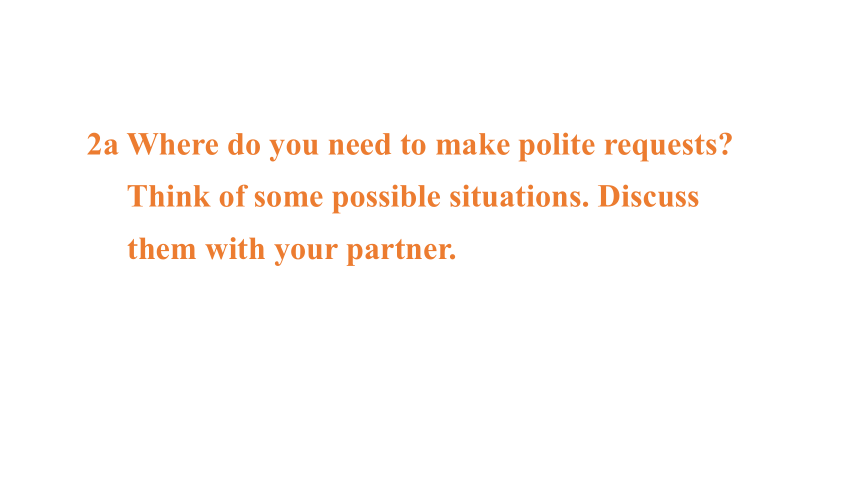




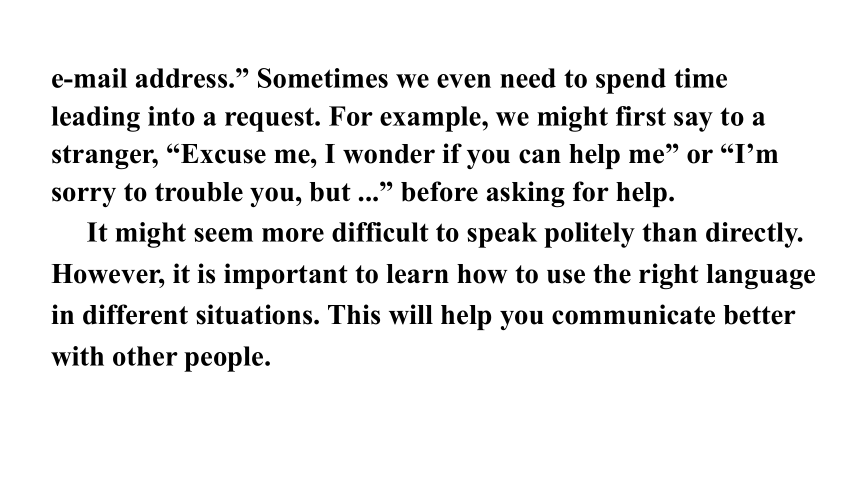
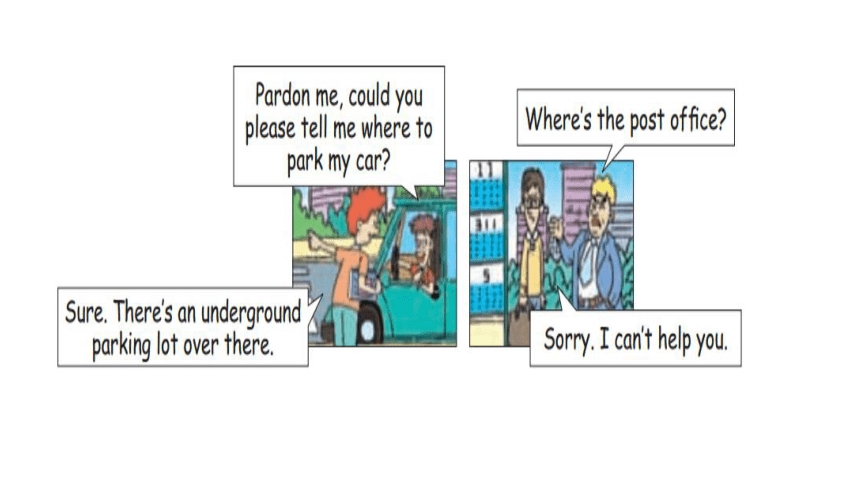
文档简介
(共37张PPT)
Unit 3
Could you please tell me
where the restrooms are
(Section B 2a-2d)
1. Understand the passage about where, when and how to make polite requests.
2. Learn how to use suitable language in different situations.
3. Try to use Object clauses politely and freely in daily communication.
Learning Objectives
Revision
Sure, go east along this street, then you’ll see it.
Could you please tell me where the nearest bank is
You are a tourist in a city, you want to know something about the city.
And do you know where the biggest hospital is
Sure. Walk along this street, the restaurant is on you right.
Can you tell me if there is a delicious restaurant near here
Go down this street, turn left at the first crossing, you will see it.
After dinner, I want to buy a pair of shoes, would you mind telling me where the nearest supermarket is
It’s over there, just across from you.
Haha! I see it. Thank you very much!
You are welcome.
2a Where do you need to make polite requests
Think of some possible situations. Discuss
them with your partner.
Using suitable language
In different situations, you need to choose and use
suitable language based on cultural knowledge.
Could You Please ...
When you visit a foreign country, it is important to know how to ask for help politely. For example, you may ask “Where are the restrooms ” or “Could you please tell me where the restrooms are ” These are similar requests for directions. Both are correct, but the first one sounds less polite.
2b Read the article and underline the topic sentence for each paragraph.
That is because it is a very direct question. It is not enough to just ask a question correctly. We also need to learn how to be polite when we ask for help.
Good speakers change the way they speak in different situations. The expressions they use might depend on whom they are speaking to or how well they know each other. It is all right to ask your classmates direct questions because you know them well. However, if you
say to your teacher, “When is the school trip ”, this might sound impolite. But if you say, “Excuse me, Mr. West. Do you know when the school trip is ”, this will sound much more polite.
Usually polite questions are longer. They include expressions such as “Could you please ... ” or “May I ask ... ” It sounds more polite to say, “Peter, could you please tell me your e-mail address ” than “Peter, tell me your
e-mail address.” Sometimes we even need to spend time leading into a request. For example, we might first say to a stranger, “Excuse me, I wonder if you can help me” or “I’m sorry to trouble you, but ...” before asking for help.
It might seem more difficult to speak politely than directly. However, it is important to learn how to use the right language in different situations. This will help you communicate better with other people.
Use more words to help you
sound more polite.
It is important to know how
to make requests politely.
Good English speakers need to
know how to speak politely.
The choice of language depends on the situation and the relationship between the speakers.
Paragraph 1
Paragraph 2
Paragraph 3
Paragraph 4
What else do we need to learn besides asking a question correctly when you ask for help
We need to learn how to be polite when we ask for help.
Read paragraph 1 and answer the question.
What do we need to think about when we talk to different people
We need to think about whom we speak to or how well we know them.
Read paragraph 2 and answer the question.
What can lead into a request with a stranger on the street
“Excuse me, I wonder if you can help me” or “I’m sorry to trouble you, but …” before asking for help.
Read paragraph 3 and answer the question.
1. When you visit a foreign country, it is important to know how to ask for help politely. 当你去国外旅游时,知道如何礼貌地寻求帮助很重要。
politely作副词,意为“礼貌地;客气地”
He is a polite child. He speaks to everyone politely. 他是个有礼貌的孩子。他对每个人说话都很有礼貌。
Language points
polite + -ly politely
(adj. 有礼貌的) (adv. 有礼貌地)
impolite + -ly impolitely
(adj. 无礼的) (adv. 无礼地)
Language points
2. For example, “Where are the restrooms ” or “Could you please tell me where the restrooms are ” are similar requests for directions to a place.
request是可数名词,意为“要求;请求”,其后常接“for +名词”,意为“……的要求/请求”。
We must make a request for help.
我们必须请求帮助。
Language points
request用作及物动词,意为“要求;请求”。
①request sth. (from/of sb.)意为“(向某人) 请求某物”。
He requested some hot water from me.
他向我要了些热水。
②request sb. to do sth.意为“请求某人做某事”。
They requested him to leave at once.
他们要求他立刻离开。
Language points
③request + that从句(从句用虚拟语气,谓语动词用should +动词原形,should可省略)。意为“请求/要求……”
I requested that she should come an hour earlier.
我请她早一小时来。
Language points
3. Both are correct English, but the first one sounds less polite. 两者都是正确的,但第一句听起来不如第二句显得礼貌。
correct此处用作形容词,意为“正确的;恰当的”,相当于right,其副词形式为correctly。
I can tell you the correct answer.
我可以告诉你正确答案。
(2) correct用作动词,意为“改正”。
You must correct the mistakes in your homework.
你必须改正作业中的错误。
Language points
4. Usually polite questions are longer and include more language such as “Could you please ... ” or “Can I ask ... ”
有礼貌的问句通常更长一些,而且包括像 “Could you please ... ”或“Can I ask ... ”之类的表达方式。
include作及物动词,意为“包括;包含”。
The price includes both the house and the furniture inside.
这个价格包括房子和里面的家具。
Language points
拓展
① including用作介词,意为“包括;包含在内”,后接名词、代词或动词-ing形式。
Six people, including a baby, were injured in the accident.
事故中有6人受伤,其中包括一名婴儿。
② included形容词,意为“包括在内的”,置于名词之后。
There are 100 people in this school, 20 teachers included.
这所学校有100个人,包括20名老师。
Language points
5. Sometimes we even need to spend time leading into a request.
有时, 我们甚至需要花些时间来导入一个请求。
lead into意为“引入;导人”。
We often use “excuse me” to lead into a request. 我们常用 “excuse me”来导入一个请求。
lead to意为“导致;通向”。
Too much work and too little rest often lead to illness.
过量的工作和过少的休息经常引起疾病。
Language points
6. I look forward to your reply.
我期待您的回复。
(1)look forward to表示“盼望;期待”,相当于expect,其中to
为介词,后面接v.-ing形式。
I’m looking forward to seeing you again.
我期待着再见你。
(2)reply用作名词,意为“答复”,相当于answer, 表示“……
的答复”时,reply与answer都需要与to连用。
I received no reply/answer to my request.
我的要求没有收到任何答复。
Language points
拓展:
①reply用作不及物动词,意为“回答,回复”, reply to sb./sth.表示“对某人/某事作出回答”。用作及物动词,其后可接宾语从句。
He didn’t reply to my letter.
他没有回复我的信。
②answer作及物动词,其后可直接跟名词或代词作宾语。
Please answer my question.
请回答我的问题。
Language points
2c Find all the direct questions and polite requests
from the passage.
Direct questions Polite requests
1. 2. 3. 1.
2.
3.
Make a request using the pictures below.
Make a request using the pictures below.
Make a request using the pictures below.
2d Read the requests below. In the second column, write A if you would say it to someone you know and B if you would say it to a stranger. In the last column, write where you think these people are.
Request Person Place
1. Will you pass the salt
2. Do you know where I can change some money, please
Request Person Place
3. Could you tell me what just happened
4. Could you please tell me where the nearest station is
5. Excuse me, do you know what time it begins, please
6. Let me know when you’re ready, OK
7. Could you possibly tell me the way to the village school
Pair work
How to ask politely
Bad Good
Where are the corn chips
There’s no milk left
How does this work
Slice it thicker / thinner.
Give me a pound of that.
Could you tell me where the corn chips are, please
Is there any more milk, (please)
Can you show me how this works
(e.g. a coffee grinder)
I’d like it sliced thicker / thinner, please.
Will you give me a pound of that, please
Can/Could I have a pound of that, please
Homework
Master the words and expressions in this class.
Preview the next part.
Thank you!
Unit 3
Could you please tell me
where the restrooms are
(Section B 2a-2d)
1. Understand the passage about where, when and how to make polite requests.
2. Learn how to use suitable language in different situations.
3. Try to use Object clauses politely and freely in daily communication.
Learning Objectives
Revision
Sure, go east along this street, then you’ll see it.
Could you please tell me where the nearest bank is
You are a tourist in a city, you want to know something about the city.
And do you know where the biggest hospital is
Sure. Walk along this street, the restaurant is on you right.
Can you tell me if there is a delicious restaurant near here
Go down this street, turn left at the first crossing, you will see it.
After dinner, I want to buy a pair of shoes, would you mind telling me where the nearest supermarket is
It’s over there, just across from you.
Haha! I see it. Thank you very much!
You are welcome.
2a Where do you need to make polite requests
Think of some possible situations. Discuss
them with your partner.
Using suitable language
In different situations, you need to choose and use
suitable language based on cultural knowledge.
Could You Please ...
When you visit a foreign country, it is important to know how to ask for help politely. For example, you may ask “Where are the restrooms ” or “Could you please tell me where the restrooms are ” These are similar requests for directions. Both are correct, but the first one sounds less polite.
2b Read the article and underline the topic sentence for each paragraph.
That is because it is a very direct question. It is not enough to just ask a question correctly. We also need to learn how to be polite when we ask for help.
Good speakers change the way they speak in different situations. The expressions they use might depend on whom they are speaking to or how well they know each other. It is all right to ask your classmates direct questions because you know them well. However, if you
say to your teacher, “When is the school trip ”, this might sound impolite. But if you say, “Excuse me, Mr. West. Do you know when the school trip is ”, this will sound much more polite.
Usually polite questions are longer. They include expressions such as “Could you please ... ” or “May I ask ... ” It sounds more polite to say, “Peter, could you please tell me your e-mail address ” than “Peter, tell me your
e-mail address.” Sometimes we even need to spend time leading into a request. For example, we might first say to a stranger, “Excuse me, I wonder if you can help me” or “I’m sorry to trouble you, but ...” before asking for help.
It might seem more difficult to speak politely than directly. However, it is important to learn how to use the right language in different situations. This will help you communicate better with other people.
Use more words to help you
sound more polite.
It is important to know how
to make requests politely.
Good English speakers need to
know how to speak politely.
The choice of language depends on the situation and the relationship between the speakers.
Paragraph 1
Paragraph 2
Paragraph 3
Paragraph 4
What else do we need to learn besides asking a question correctly when you ask for help
We need to learn how to be polite when we ask for help.
Read paragraph 1 and answer the question.
What do we need to think about when we talk to different people
We need to think about whom we speak to or how well we know them.
Read paragraph 2 and answer the question.
What can lead into a request with a stranger on the street
“Excuse me, I wonder if you can help me” or “I’m sorry to trouble you, but …” before asking for help.
Read paragraph 3 and answer the question.
1. When you visit a foreign country, it is important to know how to ask for help politely. 当你去国外旅游时,知道如何礼貌地寻求帮助很重要。
politely作副词,意为“礼貌地;客气地”
He is a polite child. He speaks to everyone politely. 他是个有礼貌的孩子。他对每个人说话都很有礼貌。
Language points
polite + -ly politely
(adj. 有礼貌的) (adv. 有礼貌地)
impolite + -ly impolitely
(adj. 无礼的) (adv. 无礼地)
Language points
2. For example, “Where are the restrooms ” or “Could you please tell me where the restrooms are ” are similar requests for directions to a place.
request是可数名词,意为“要求;请求”,其后常接“for +名词”,意为“……的要求/请求”。
We must make a request for help.
我们必须请求帮助。
Language points
request用作及物动词,意为“要求;请求”。
①request sth. (from/of sb.)意为“(向某人) 请求某物”。
He requested some hot water from me.
他向我要了些热水。
②request sb. to do sth.意为“请求某人做某事”。
They requested him to leave at once.
他们要求他立刻离开。
Language points
③request + that从句(从句用虚拟语气,谓语动词用should +动词原形,should可省略)。意为“请求/要求……”
I requested that she should come an hour earlier.
我请她早一小时来。
Language points
3. Both are correct English, but the first one sounds less polite. 两者都是正确的,但第一句听起来不如第二句显得礼貌。
correct此处用作形容词,意为“正确的;恰当的”,相当于right,其副词形式为correctly。
I can tell you the correct answer.
我可以告诉你正确答案。
(2) correct用作动词,意为“改正”。
You must correct the mistakes in your homework.
你必须改正作业中的错误。
Language points
4. Usually polite questions are longer and include more language such as “Could you please ... ” or “Can I ask ... ”
有礼貌的问句通常更长一些,而且包括像 “Could you please ... ”或“Can I ask ... ”之类的表达方式。
include作及物动词,意为“包括;包含”。
The price includes both the house and the furniture inside.
这个价格包括房子和里面的家具。
Language points
拓展
① including用作介词,意为“包括;包含在内”,后接名词、代词或动词-ing形式。
Six people, including a baby, were injured in the accident.
事故中有6人受伤,其中包括一名婴儿。
② included形容词,意为“包括在内的”,置于名词之后。
There are 100 people in this school, 20 teachers included.
这所学校有100个人,包括20名老师。
Language points
5. Sometimes we even need to spend time leading into a request.
有时, 我们甚至需要花些时间来导入一个请求。
lead into意为“引入;导人”。
We often use “excuse me” to lead into a request. 我们常用 “excuse me”来导入一个请求。
lead to意为“导致;通向”。
Too much work and too little rest often lead to illness.
过量的工作和过少的休息经常引起疾病。
Language points
6. I look forward to your reply.
我期待您的回复。
(1)look forward to表示“盼望;期待”,相当于expect,其中to
为介词,后面接v.-ing形式。
I’m looking forward to seeing you again.
我期待着再见你。
(2)reply用作名词,意为“答复”,相当于answer, 表示“……
的答复”时,reply与answer都需要与to连用。
I received no reply/answer to my request.
我的要求没有收到任何答复。
Language points
拓展:
①reply用作不及物动词,意为“回答,回复”, reply to sb./sth.表示“对某人/某事作出回答”。用作及物动词,其后可接宾语从句。
He didn’t reply to my letter.
他没有回复我的信。
②answer作及物动词,其后可直接跟名词或代词作宾语。
Please answer my question.
请回答我的问题。
Language points
2c Find all the direct questions and polite requests
from the passage.
Direct questions Polite requests
1. 2. 3. 1.
2.
3.
Make a request using the pictures below.
Make a request using the pictures below.
Make a request using the pictures below.
2d Read the requests below. In the second column, write A if you would say it to someone you know and B if you would say it to a stranger. In the last column, write where you think these people are.
Request Person Place
1. Will you pass the salt
2. Do you know where I can change some money, please
Request Person Place
3. Could you tell me what just happened
4. Could you please tell me where the nearest station is
5. Excuse me, do you know what time it begins, please
6. Let me know when you’re ready, OK
7. Could you possibly tell me the way to the village school
Pair work
How to ask politely
Bad Good
Where are the corn chips
There’s no milk left
How does this work
Slice it thicker / thinner.
Give me a pound of that.
Could you tell me where the corn chips are, please
Is there any more milk, (please)
Can you show me how this works
(e.g. a coffee grinder)
I’d like it sliced thicker / thinner, please.
Will you give me a pound of that, please
Can/Could I have a pound of that, please
Homework
Master the words and expressions in this class.
Preview the next part.
Thank you!
同课章节目录
- Unit 1 How can we become good learners.
- Section A
- Section B
- Unit 2 I think that mooncakes are delicious!
- Section A
- Section B
- Unit 3 Could you please tell me where the restroom
- Section A
- Section B
- Unit 4 I used to be afraid of the dark.
- Section A
- Section B
- Unit 5 What are the shirts made of?
- Section A
- Section B
- Review of Units 1-5
- Unit 6 When was it invented?
- Section A
- Section B
- Unit 7 Teenagers should be allowed to choose their
- Section A
- Section B
- Unit 8 It must belong to Carla.
- Section A
- Section B
- Unit 9 I like music that I can dance to.
- Section A
- Section B
- Unit 10 You're supposed to shake hands.
- Section A
- Section B
- Review of Units 6-10
- Unit 11 Sad movies make me cry.
- Section A
- Section B
- Unit 12 Life is full of the unexpected
- Section A
- Section B
- Unit 13 We're trying to save the earth!
- Section A
- Section B
- Unit 14 I remember meeting all of you in Grade 7.
- Section A
- Section B
- Review of Units 11-14
